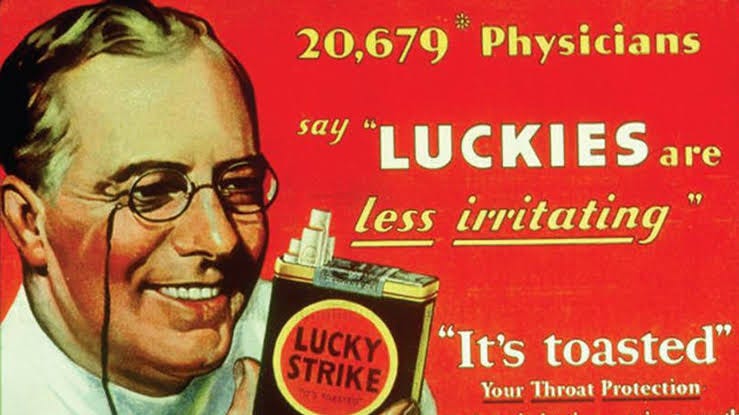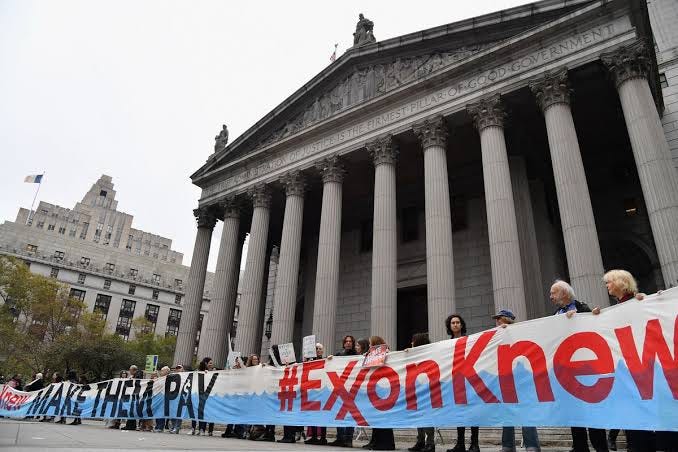Crisis? What Crisis?
It'll come true if you say it will.
Mark Twain didn’t say;
“History never repeats itself but it rhymes.”
.. but it is a famous line that plays well with this week’s missive that emerges from a recurring question that I am constantly asked in various forms. To paraphrase three recent examples …
“I don't know how how we are going to get out of this. Individuals can make choices to opt out but it's too difficult, and most won't do it anyway.”
and
“How can an ‘ordinary joe’ do something and make a difference? Change buying habits? Insist it is part of a political agenda? Stop supporting x,y,z financially?
and
“All good But what can I do about it?”
Here’s one answer …..
Good Thoughts. Good Questions.
What can you do? A lot!

The Tobacco industry knew about the impact of their product since the mid-50s but did nothing other than lobby the government and fill the world with bogus research and marketing hype - to put our minds at rest. It took half a century before that playing field to even start to be levelled.

The Oil industry knew about the impact of their product since the late-70s but did nothing other than lobby the government and fill the world with bogus research and marketing hype - to put our minds at rest. Fifty years later, we are beginning to see movement .. but only just. [Climate Change : Appendix]
The Tech Problem.
50 years (half a century) ago Oracle and Microsoft didn’t exist. Larry Page, Sergey Brin and Sundar Pichai were yet to be born. Likewise Mark Zuckerberg and Jack Dorsey.
THE tech companies of the day were HP, IBM and ‘olther mainframe businesses’ like Sperry, Unisys, ICL and Groupe Bull. 1970 was also the year that Gene Amdahl left IBM and founded his company, which has now been gone for so long most outside the industry barely remember it.
In the early 70s, Ken Olsen of Digital Equipment famously quipped that he couldn’t see any need or any use for a computer in someone’s home.
Good grief, despite that the foundation of the internet was in place, TCP and IP hadn’t yet been developed and the World Wide Web had to wait another 20 years before it made an appearance.
That is, in the half a century it has taken for ‘we the people’ to become properly aware of the dangers of Tobacco and more significantly, Climate Change, the tech industry has moved from mainframe to mini to PC, to ‘connected’, to ‘hyper-connected’, to social to surveillance.
So yes, relatively new and moving at such a pace that we cannot be complacent. Technologies such as AI, Machine Learning, Robotics, Facial Recognition, Online Tracking, Behavioural Manipulation … are very new kids on the block, but the word is out. We have a problem and that problem is being exacerbated every single day.
What Can We Do?
Through the lessons of ‘climate change’ and ‘big tobacco’, we have learned what works and what doesn’t and we know that none of it changed before public opinion started to push the bar.
That’s how People First came to be. A desire to broaden the scope and reach of what organizations like the EFF, MyData, Me2B, IIW, Customer Commons, Identity Commons, DigLife and many more already know and are working on. It’s all good, but the message needs to get louder and spread wider.
Case in point …. Facebook was caught in a massive scandal that continues to rock democracy today. Nobody has been fined, nobody has gone to prison, and business continues. A furore erupted over how could Facebook abuse its trust? What trust? Trust isn’t even mentioned in their Terms of Service and despite the wringing of hands and shaking of heads … people (generally) don’t leave, Facebook continues to grow and ‘Facebookers’ still wonder how Facebook knows so much about them.
Here’s A Clue. The graphic below comes from Stratechery and today - that little box on the right - you know - where you save your self some times and use ‘Facebook Login’ - that little box represents 10 million websites - and counting .. and what you do on that site gets sent to Facebook for ‘processing’. Google and Twitter? What do you think?

By the way, WhatsApp and Instagram are both owned by Facebook. I know you know that but 71% of Americans do not. I see that as a real problem because it is symptomatic.
Getting The Word Out.
If you don’t read Ben’s work. You should, but also …
Nir Eyal wrote the book on ‘How to Build Habit-Forming Products’ over 7 years ago.
A couple of years before that Doc Searls wrote ‘The Intention Economy’. (Side note” Seth Godin said at the time: “Profound, far-reaching, and one of those books people will be bragging about having read five or ten years from now.” … are you bragging?)
Shoshana Zuboff published ‘The Age of Surveillance Capitalism’ just one year ago.
There is a veritable army of people, talking, writing, presenting and commenting on this. It is not new and certainly not unknown, but the message is sometimes hard to assimilate - which is one reason why it has not reached ‘peak public’. Still. Even without that, the tech industry is already on the back foot, two examples from two of the most powerful companies …
In a Washington Post op-ed, the Facebook CEO is calling on “governments and regulators” around the world to help rein in the internet, and his own company.
… Peter Kafka, Recode, VoxMedia
and
Google CEO: 'Artificial intelligence needs to be regulated'
… The Hill
Weasel words in my opinion. But that’s a separate story. The short version of which is that this is the oldest trick in the book …. how many people in your government are technical enough to understand the issues and want to do something about it?
So How Do We Fight Back?
The armour is getting dented. We - and mean ‘we’ as in all of us, need to do more.
The reason we know as much as we do about what the tech industry is up to compared to tobacco in the 50s and Oil/Climate in the 70s is that today we have the internet that provides us so much information. In some ways, abuse of the internet is the very thing that we are fighting, but it is also our advantage in so many different ways. We can use it to communicate. To organize. To collaborate. To inform. To resist. It’s extraordinary what a 2,500-year-old book can teach us.
“The opportunity of defeating the enemy is provided by the enemy himself.”
… Sun Tzu, The Art of War
And what strategies do we use to fight this war? How do you beat a trillion-dollar (and counting) business? Well, that same book goes on …
Victorious warriors win first and then go to war, while defeated warriors go to war first and then seek to win.
… Sun Tzu, The Art of War
Think about that. Win first and then go to war. [Starting To Win: Appendix] It was a small win - but now we need to build on it. Keep up the pressure. Across the board.
We might not understand why exactly smoking is bad for us, but we don’t argue. Few of us can really describe the science behind climate change, but most rational people know something is going on. The same goes for ‘fighting’ tech - and by ‘fighting tech’, I don’t mean assuming the position of Luddites. I mean pushing the industry to do what is right and return technology to being a tool of people - not of ‘controllers’.
For my part, this is exactly what this newsletter, associated blog and the forthcoming book is about. These vehicles will be extended with a community of like-minded thinkers that will allow us all to keep pushing the boundaries of what needs to happen. I’ve written a little bit about how this could be started. [Marketing 101: Appendix] - though the elements, the tools and the environments needed to implement that plan are not yet public.
What you can do (apart from changing behaviour - every little helps) is to get and be involved. Keep spreading the word. Keep sharing. Keep talking. Join the spaces and places where topics like this are discussed. Build awareness and understanding. And. Most importantly. Don’t throw in the towel. Don’t decide that it is ‘too hard’. That ‘they’ have won. ‘They’ haven’t.
Technologies and solutions already exist to change some of this, we need them to find the light of day. For example, the infrastructure that will underpin the People First Community won’t be Slack or Facebook/LinkedIN groups or Google Docs or any other of the current systems that people fall back on - more on this when released.
Bottom line ….
“It’s time for us to rise to the occasion of our own humanity. We are not perfect, by any means. But we are not alone. We are Team Human.
Find the others.”
… Douglas Rushkoff, Team Human (closing lines)
The title of this newsletter comes from Supertramp’s 4th album released 45 years ago. If the words don’t hit, surely the image does?
You're holding the world in the palm of your hand,
What you're tellin' your children you don't understand
…
Just look at the madness that glows in your eyes,
You're frightened your children will steal your disguiseRoger Hodgson, The Meaning, Crisis? What Crisis?

The subtitle comes from a nine-year-old song …
It's emotional and I told you so
But you had to know so I told you
Soft walk to horizon
One big crash that no one dies in
This for the folks in Fayetteville
It'll come true if you say it will… Red Hot Chilli Peppers, Look Around, I’m With You.
This Week’s Eight Pillar Index.

My thanks for your continued support and attention. Please - more than ever like the post, share through your social channels of choice and forward the email to colleagues, friends and family that want to join us on this journey. I truly appreciate all of your support and all your comments (positive and negative).

